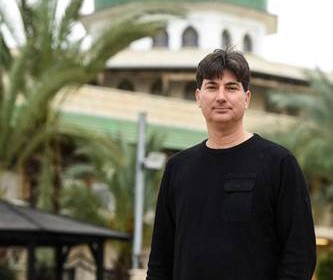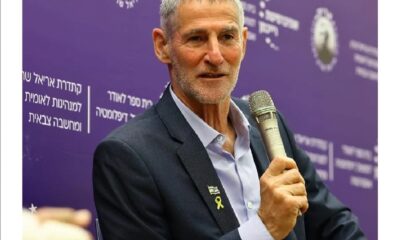
Featured Item

Promoting understanding between Israelis and Arabs
The author of The Only Jew in the Room, which chronicles his journey as the first and only Jew to study at Al-Qasemi, an Arab Islamic Sufi College in Israel, Israeli-born Avi Shalev first began learning Arabic when he lived in South Africa between the ages of 14 and 22. Now a retired lieutenant colonel in the Israel Defense Forces (IDF), his insights into Israeli and Arab life give him a unique perspective on the war in Gaza.
“What we failed at in 1973 – the Yom Kippur War – and we failed at again in October 2023 is understanding the Arab mindset. As Jews and as Israelis, this is something we find very difficult,” Shalev said, addressing South Africans at a webinar hosted by The Base Shul on 27 March.
“Understanding Arabs is our biggest challenge, and because we’re so technologically advanced and skilled here, we tend to invest all our capacities in sophisticated technologies. We thought that artificial intelligence would solve the problem of understanding our neighbours, our enemies. The failure on 7 October 2023 is an indication that it’s not enough. This intelligence failure will probably be studied for years in Israel and all over the world because of its epic proportions.”
During the webinar, facilitated by Peregrine Holdings Chief Executive Robert Katz, Shalev shared his experiences of both the IDF and Al-Qasemi. Now 52, he lives in Modi’in in Israel, and has four children, two serving in the IDF and a third about to follow suit. His book, originally published in Hebrew as The Al-Qasemi Diary was recently translated into English with the title The Only Jew in the Room.
From 1985 to 1993, Shalev lived in South Africa, where his father had business interests. Shalev completed his schooling at Greenside High School, a BCom at the University of the Witwatersrand, and an Honours at the University of South Africa. It was also in Johannesburg that he began to learn Arabic informally with some Indian-Muslim neighbours. At the age of 22, he returned to Israel as a lone soldier. He spent six years in the research division in Israeli military intelligence, and a further 18 in civil administration in Judea and Samaria and the Gaza Strip.
Speaking of his intelligence work, Shalev said his unit’s focus was twofold: understanding the capabilities and intentions of Israel’s neighbours and enemies, two very different intelligence issues. Though Israeli intelligence is good at collecting information, which illustrates the enemy’s capabilities in terms of weapons, training, and technology, it’s less skilled at understanding its intentions, he said.
He engaged with this challenge through 24 years in the military, and during the six years that followed, through studies fuelled mainly by “intellectual curiosity”. Upon retiring six years ago with a military pension, he decided to do a Master’s degree in Islamic Studies at Berlin University.
“There, for the first time in my life, I actually studied with Muslims, with Palestinians from the West Bank, Muslims from Pakistan, Arabs from Lebanon, and also Europeans and Americans. It was an incredible experience, but it made me realise that I had been studying Muslims, Palestinians, and Arabs from the Israeli intelligence perspective, from a Western perspective.”
Even at Berlin University, while highly acclaimed, his lecturers mainly came from Jewish or European backgrounds. “We are always doing the same thing,” he said, “teaching ourselves about Arabs and Muslims when they weren’t in the room. We were learning about them, not with them.”
That’s why he decided to find an Arab, Islamic institution to study with Arabs as equals. Al-Qasemi, in Baqa al-Gharbiyye, an Arab-Muslim town in Israel on the border with Samaria in the northern West Bank, is one of three Arab colleges in Israel where Arabs study education. Al-Qasemi is unique because it’s also Islamic, and was set up by Sufi sects, which practice a mystical stream of Islam, similar to Judaism’s Kabbalah. During his studies there, Shalev documented his experience, which ultimately formed the basis of his book. He has also since worked at an Arab school and an Arab college.
“I was the first Jew, the first Israeli Jew, to study in an Arab-Muslim institution in Israel, which amazed me. It’s telling about our efforts to understand Arabs,” he said. “Cultural understanding is maybe the greatest challenge that we as Israelis face regarding Arabs, because we don’t understand the Arabs, and they don’t understand us.”
Israelis who want to learn about Arabs and Islam mainly go to mainstream Israeli universities, where they learn from Jewish lecturers, thinkers, and researchers, which perpetuates this divide. Welcomed at Al-Qasemi, Shalev was among Arab students, mainly religious and conservative Muslim women, who came from the Negev (desert) in the north, most of whom didn’t speak Hebrew in spite of having Israeli identities and passports.
While some students wouldn’t speak to him and were suspicious of his motives, Shalev says others were friendly and helped him through the challenge of studying, reading, and writing in academic Arabic. His book examines what it means to be a Palestinian Israeli – Israeli Arabs view themselves as Palestinians living in Israel, he said – and looks at overarching themes of understanding the other, and why Israelis have such difficulties understanding Palestinians and vice versa.
Though Shalev isn’t too optimistic about the future with regards to Gaza, he says a positive factor is that we have a better understanding of who we’re dealing with. “It’s incredible that Hamas has remained to this day completely committed to the annihilation of Israel, irrespective of the price,” he says. “This was a major blunder on the part of Israeli intelligence, because few believed that it would go so far. Today, we understand that Hamas has invested absolutely all its resources, and it’s not shy to say that, as far as it’s concerned, it’s investing only in jihad and the responsibility for the welfare of Gazans is on the international community. Sometimes it’s better to be a realist than an idealist.”
Ultimately, any way forward, comes with understanding, he said. “For Israelis to understand Gaza, they really have to understand the people, the language, the culture, the hopes, and aspirations. It doesn’t mean they have to accept all of this, but they really have to understand it.”










